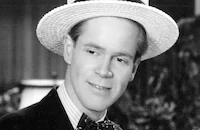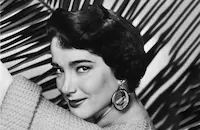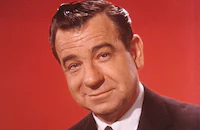Slaughter on Tenth Avenue
Brief Synopsis
Cast & Crew
Arnold Laven
Richard Egan
Jan Sterling
Dan Duryea
Julie Adams
Walter Matthau
Film Details
Technical Specs

Synopsis
Solly Pitts, the honest hiring boss for the New York City longshoremen, is brutally shot on his stairwell by racketeering union boss Eddie "Cockeye" Cook and his thugs, Tilly Moore and Leo Shaker. District Attorney Howard Rysdale reluctantly assigns the case to inexperienced assistant William Keating, warning him that the wharf has a long and complex history. Solly is alive but weak, and police lieutenant Anthony Vosnick brings Bill to the hospital to question him. There, Solly's wife Madge, who trusts Vosnick, admits that her husband named his attackers, but Solly, hoping to protect Madge, refuses to speak to the authorities. Vosnick explains to Bill that Solly runs the only lawful area of the pier, and that Cockeye's superior, Al Dahlke, plans to run him out of town. After failing to get any more information out of Madge, Bill heads to the docks, where the men refuse to talk to him. After drunken longshoreman Midget rails loudly against the racket, Bill watches helplessly as Dahlke sets his henchmen after him. Bill follows Midget to his home, where the broken man, who assumes Bill is on Dahlke's payroll, bitterly asks him where the police were when the racketeers moved in. Later at the police station, Vosnick explains that Midget once spoke out against the crooks, but after they broke his back, he lost his job and later his wife and children. Although Cockeye presents his falsified alibi for the day of the attack, Bill holds him in jail, but realizes that Solly and Madge's testimony represent his only hope for an indictment. While looking at an apartment with his fiancée, Dee Pauly, Bill recalls his coal miner father taking him to a union meeting and keeping order with his fists, and Dee counsels him to use his head rather than his brawn. They are interrupted by ex-policeman Sid Wallace, now a private investigator, who invites them to dinner in Chinatown. At the restaurant, Sid introduces Dahlke as "a friend," after which Dahlke offers his underworld connections to Bill in exchange for letting Cockeye go free. Bill spurns him, prompting Dahlke to make vague threats. Bill goes to Rysdale to push for quick action, knowing that the longshoremen will support the law once they believe it is on their side, but the district attorney cautions him to move slowly and remember that everyone has an angle. The next day, a prisoner named "Monk" Mohler claims that Cockeye offered him money to provide a false alibi. Bill is excited by the breakthrough until Rysdale reveals that Monk merely wants to trade this information for a lightened sentence, and is not a credible witness. With only hours left before he must release Cockeye for lack of evidence, Solly decides to testify against Cockeye, and Bill goes to the hospital to record the dying man's statement. The police bring Cockeye there for Solly to identify, but Cockeye attacks the ill man, who later regrets that he is dying "a rat." While Cockeye hires expert attorney John Jacob Masters, Bill and Rysdale review the case, which relies exclusively on Solly and Madge's testimony. Bill and Rysdale then go to Madge's apartment and there badger her to test the strength of her conviction, and although she holds up under the pressure, she later receives phone threats that unsettle her. Soon after, Bill and Dee are married, and one of the telegrams they receive at the reception includes another death threat. That night, the hospital calls Madge to inform her that Solly is dying, but she is so afraid to answer the phone that she misses the call. At Solly's wake, his best friend, Benjy Karp, confesses to Bill that he saw Moore running from Solly's apartment building the day of the shooting. Bill attends a meeting of the district attorney office, and when the group votes to postpone the trial until they have more evidence, Bill heatedly accuses Rysdale of possible collusion, and insists they take the matter to the mayor. The mayor roundly chastises Bill, who storms out of the meeting. Bill is telling the story to Dee that night when Rysdale informs him that the mayor agreed with Bill's assessment of the case, and wants Bill to prosecute it himself. At the trial, Masters impugns each witness, painting Benjy as a liar and Solly as uncredible, causing Benjy to lose the little faith he had gained in the legal system. When Bill calls Madge to the stand, she cannot be found. Three days later, Bill finds Benjy at the wharf preparing for an illegal strike against Dahlke. Although Benjy will not back down, he reveals that Madge is in Brooklyn, and Bill convinces her to return to the city under his care. Back at the trial, Masters attacks Madge's character, then points out that Bill held Cockeye under false pretenses, and finally accuses Vosnick of setting up Cockeye. In their closing arguments, Masters presses the issue of reasonable doubt, while Bill emphasizes the facts in the case and the courage of the witnesses. The jury remains in deliberation for hours, during which Bill learns that Benjy's men have begun their strike. He rushes to the pier, where Dahlke has arrived with trucks full of thugs, and when Bill punches Dahlke, a riot breaks out. When the police arrive and arrest the group, Vosnick and Rysdale pull Bill out of the melee and into the waiting arms of Dee. Midget staggers out of the crowd into the liquor store, where he hears a radio announcement that Cockeye, Moore and Shaker have been convicted, in one of the first victories of its kind in the city waterfront. Tottering into the street in delight, Midget finds Bill's abandoned briefcase, and picks it up reverently.

Director

Arnold Laven
Cast

Richard Egan

Jan Sterling

Dan Duryea

Julie Adams

Walter Matthau

Charles Mcgraw

Sam Levene

Mickey Shaughnessy

Harry Bellaver

Nick Dennis
Joe Downing
Ned Wever
Billy M. Greene
John Mcnamara
Amzie Strickland
Mickey Hargitay
Crew
Glen Anderson Jr.
Fred Banker
Phil Bowles
Adele Cannon
Leslie I. Carey
Dan Carlin
Don Carlin
Haile Chale
Ellis Coleman
Ray De Camp
Norman Deming
Russell A. Gausman
Joseph Gershenson
Herschel Burke Gilbert
Alexander Golitzen
Julia Heron
Bob Hirsch
Edith House
Fred Jackman [jr.]
Virginia Jones
Rollie Lane
Nevada Penn
Bob Pierce
Ed Pyle
Richard Rodgers
Lawrence Roman
Bucky Rous
Russell F. Schoengarth
Robert E. Smith
Clifford Stine
James Swartz
Bill Thomas
James Welch
Bud Westmore
Monte Westmore
Frank Wilkinson
Albert Zugsmith

Film Details
Technical Specs

Articles
Slaughter on Tenth Avenue
In an apartment building near the waterfront, longshoreman boss Solly Pitts (Mickey Shaughnessy) is gunned down by two men that he obviously recognizes. Though he is left for dead, Pitts is only wounded, and names his assailants to his wife Madge (Jan Sterling). Lawyer William Keating (Richard Egan) is working as a deputy assistant to the District Attorney when he is assigned to investigate the attempted murder. Keating has never covered such a high-profile case before, and in an understatement, he is told "These waterfront cases tend to get involved." Indeed, when Keating interviews the Pitts, as well as witnesses and fellow dockworkers Benjy (Harry Bellaver) and Midget (Nick Dennis), he discovers that there is a conspiracy of silence surrounding the sordid waterfront goings-on. Keating eventually determines the suspects, but they are being protected by a corrupt labor leader, Al Dahlke (Walter Matthau), who arrogantly flaunts his wide-reaching influence. When Keating takes his case to trial, he goes against another colorful character, the defense lawyer John Jacob Masters (Dan Duryea), a flashy dresser who will always sell his services to the highest bidder.
Rather than give their film the same title as the true-life book from which it was adapted, The Man Who Rocked the Boat, Universal wisely borrowed for its title and main musical theme a pre-sold commodity: a well-known piece of music by composer Richard Rodgers. "Slaughter on Tenth Avenue" was written for the Broadway musical comedy On Your Toes, which opened in 1936. The instrumental piece was a jazz ballet, a show-within-a-show that provided the climax for the production. (The film version of On Your Toes was released by Warner Bros. in 1939 and featured Vera Zorina and Eddie Albert dancing in the "Slaughter on Tenth Avenue" sequence. As with the Broadway show, the choreography was by George Balanchine).
In his book Lost Films of the Fifties, Douglas Brode calls Slaughter on Tenth Avenue "gritty and unsparing," and says "...the film is a fine example of the fifties crimebusting genre, featuring Walter Matthau in one of the many bad guy roles he played early in his career, at a time when no one could have guessed he would eventually emerge as one of our more beloved comic actors. Jan Sterling, always effective as a dreary, dour, washed-out blonde, was at her best here, playing a woman who understands that to reveal what she knows about her husband's death would insure that she promptly join him. Richard Egan, always searching for the role that would catapult him into the Big Leagues, certainly had a strong one here, though Dan Duryea stole the show with another of his slimy/silky villains."
Producer Albert Zugsmith guided an amazingly diverse assortment of films during his career; while the quality could vary wildly, his movies almost never committed the sin of being dull. Beginning, as many low-budget producers did, with the science-fiction genre, his first films were Captive Women, Invasion USA (both 1952), and Port Sinister (1953). Not afraid to experiment, in 1954 Zugsmith produced the odd Top Banana, which is nothing more or less than a filmed burlesque revue starring Phil Silvers and a bevy of striptease dancers. In 1955 he began a productive stint at Universal-International, where he had the chance to produce impressive A-films such as Written on the Wind (1956) and The Tarnished Angels (1958), both directed by Douglas Sirk. Zugsmith also guided some of the studio's B-films which turned out to be among the greatest examples of their genres, such as the Jack Arnold Richard Matheson science fiction classic The Incredible Shrinking Man (1957) and Orson Welles' unforgettable film noir, Touch of Evil (1958). Zugsmith closed out his career as something of a trend-follower, producing a long string of exploitation films for the youth market, chronicling the fads and fashions of the day in such films as High School Confidential! (1958), The Beat Generation (1959), College Confidential and Sex Kittens Go to College (both 1960).
As it turned out, the acquisition of the Richard Rodgers jazz ballet piece was a wise move for Universal. It was newly-arranged for the film by Herschel Burke Gilbert and an uncredited Henry Mancini. While the movie only did average business at the box-office, the 1957 soundtrack album for Slaughter on Tenth Avenue proved to be a huge seller. Its success inspired many new cover versions of the Rodgers piece over the years, by both jazz musicians and rock artists. For example, the title was used by David Bowie's lead guitarist Mick Ronson for his first solo album in 1974.
Producer: Albert Zugsmith
Director: Arnold Laven
Screenplay: Lawrence Roman, based on the book The Man Who Rocked the Boat by William J. Keating and Richard Carter
Cinematography: Fred Jackman Jr.
Film Editing: Russell F. Schoengarth
Art Direction: Alexander Golitzen, Robert Emmet Smith
Set Decoration: Russell A. Gausman, Julia Heron
Costume Design: Bill Thomas
Music: Herschel Burke Gilbert, Richard Rodgers, Henry Mancini
Cast: Richard Egan (William Keating), Jan Sterling (Madge Pitts), Dan Duryea (John Jacob Masters), Julie Adams (Dee Pauley), Walter Matthau (Al Dahlke), Charles McGraw (Lt. Anthony Vosnick), Sam Levene (Howard Rysdale), Mickey Shaughnessy (Solly Pitts).
BW-103m.
by John M. Miller

Slaughter on Tenth Avenue
Quotes
Trivia
Notes
The working title of this film was The Man Who Rocked the Boat. The opening credits begin with the following written statement: "The picture you are about to see is based on fact, but to insure the safety of people still alive, certain modifications have been made." As depicted in the film, William J. Keating (b. 1915) was an assistant district attorney whose single-minded determination and courage led to the conviction of many racketeers on the New York City waterfront. Keating went into private practice soon after writing his autobiography, The Man Who Rocked the Boat, which Universal purchased in 1956. The following year, the studio bought Richard Rodgers' song "Slaughter on Tenth Avenue," which had been written for the 1936 Broadway play On Your Toes.
Universal borrowed director of photography Fred Jackman from Columbia for this film. Although studio press announced that Hedy Lamarr would make an uncredited appearance in the picture during the scene at the modeling agency of "Dee Pauly," she did not appear in the finished film. According to studio materials, some scenes were shot on location in New York, and others at the Bethlehem Steel Co. shipyards in Long Beach, CA.
Hollywood Reporter news items add the following members to the cast: Myron Cook, George Becwar, Jack LaRue, Morgan Woodward, Julian Upton, William Vaughan, Joe Greenway, Tom Greenway, Eileen Harley, David Sharpe, Boyd Morgan, Len Lesser, Joe Marr and Kay Reid. Their appearance in the final film has not been confirmed.

Miscellaneous Notes
Released in United States Fall November 1957
Released in United States Fall November 1957













